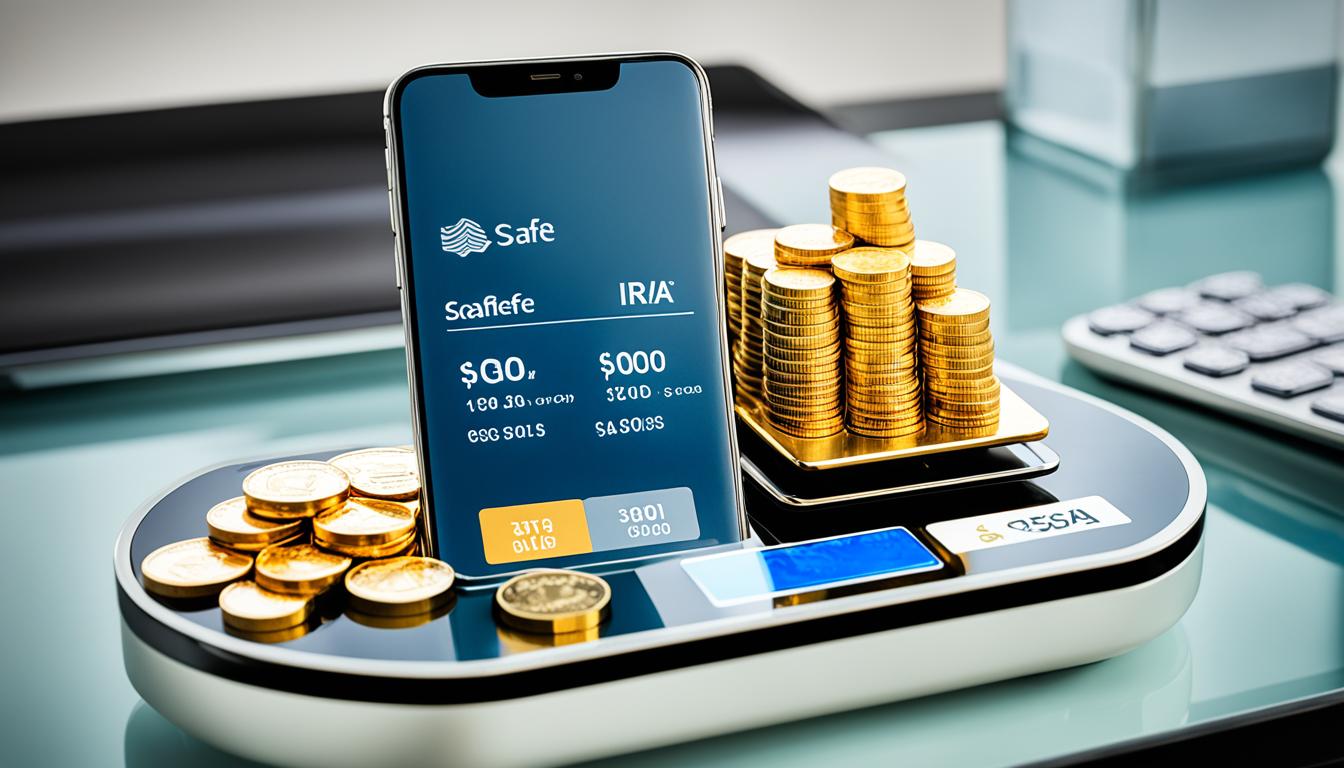Did you know that gold has been a reliable store of value for thousands of years? Ancient civilizations and modern investors alike have recognized its enduring worth, particularly in uncertain economic times. If you’re considering investing in gold, you may come across two popular options: gold Individual Retirement Accounts (IRAs) and physical gold. Understanding the differences between these investment vehicles is crucial for making informed decisions about your precious metals investments.
Key Takeaways:
- Gold IRAs and physical gold are both viable options for investing in gold, but each has its own advantages and disadvantages.
- Physical gold offers liquidity and privacy, but it comes with additional costs and the risk of counterfeit gold.
- Gold IRAs act as an insurance policy for retirement funds, offering potential tax benefits and wealth preservation.
- Gold ETFs provide ease of purchase and sale, but they come with maintenance fees and the risk of value loss.
- When investing in gold, consider your financial goals, timeline, and perspective to choose the best option for your needs.
Understanding Physical Gold Investments
Investing in physical gold offers individuals the opportunity to own tangible assets in the form of gold bars, gold coins, or bullion. This option provides investors with several advantages, including liquidity, privacy, and the ability to bypass reliance on financial institutions.
One key advantage of physical gold investments is the liquidity they offer. Gold bars, coins, and bullion can be easily sold at any time, allowing investors to convert their gold holdings into cash swiftly and efficiently. This makes physical gold a flexible investment option that can be swiftly adapted to changing financial circumstances.
Furthermore, physical gold investments provide a certain level of privacy. Unlike other investment options, such as stocks or bonds, which are often held in electronic form, physical gold is a tangible asset that can be securely stored and accessed privately.
However, it’s important to consider the potential costs associated with physical gold investments. These costs include transaction fees, dealer markups, and assay fees. Transaction costs are incurred when buying or selling physical gold, while dealer markups represent the premium added to the spot price of gold by dealers. Additionally, assay fees may be incurred when verifying the authenticity and purity of newly acquired gold.
Investors should also be aware of the potential risk of encountering counterfeit gold. This risk highlights the importance of doing proper due diligence and only purchasing physical gold from reputable and trusted dealers. Conducting thorough research and verifying the authenticity of the gold bars, coins, or bullion can minimize the risk of falling victim to counterfeiting scams.
Benefits of Physical Gold Investments:
- Liquidity: Physical gold can be easily sold and converted into cash.
- Privacy: Physical gold offers a level of privacy and allows investors to maintain control over their assets.
Considerations for Physical Gold Investments:
- Costs: Transaction fees, dealer markups, and assay fees can impact investment returns.
- Counterfeit Risk: Ensure proper due diligence and purchase from reputable dealers to mitigate the risk of counterfeit gold.

Exploring Gold IRAs
A gold IRA, short for Individual Retirement Account, is a specialized investment vehicle that allows individuals to include physical gold as part of their retirement savings strategy. Investing in gold IRAs can act as an insurance policy for your retirement funds, particularly during financial market downturns, as the value of gold typically rises in such periods, helping to preserve the overall value of your accounts.
One of the key advantages of gold IRAs is the potential tax benefits they offer. Depending on the type of IRA you have, you may enjoy tax-deferred growth on your investments or even tax-free withdrawals during retirement. These tax advantages can be substantial and contribute to significant savings over the long term.
However, it’s important to note that setting up a gold IRA involves more steps and costs compared to a traditional retirement account. You’ll need to find an approved custodian who can hold the physical gold on your behalf and ensure compliance with IRS regulations. Plus, there may be administrative fees, storage costs, and additional expenses associated with the purchase, storage, and sale of the gold.
“Investing in a gold IRA can provide a unique opportunity to diversify your retirement portfolio and potentially reap tax benefits while safeguarding your savings against economic uncertainties.”
Despite the additional complexities, investing in gold IRAs can be a smart choice for those looking to diversify their retirement savings and protect their wealth. By including physical gold in your portfolio, you can reduce reliance on traditional assets like stocks and bonds, which are susceptible to market volatility.
It’s important to conduct thorough research and consider your personal financial goals before deciding to open a gold IRA. Consulting with a financial advisor who specializes in retirement planning can provide valuable insights and guidance on the most suitable options for your specific needs.
Gold IRA vs. Traditional IRA
| Gold IRA | Traditional IRA |
|---|---|
| Invest in physical gold | Invest in stocks, bonds, mutual funds, etc. |
| Potential tax benefits (tax-deferred growth or tax-free withdrawals) | Contributions may be tax-deductible, but withdrawals are taxed as ordinary income |
| Higher setup costs and maintenance fees | Lower setup costs and maintenance fees |
| Protection against inflation | Exposure to market volatility |

When considering a gold IRA, it’s essential to weigh the potential benefits against the associated costs and complexities. Understanding the tax implications, liquidity constraints, and the role of physical gold in your overall investment strategy will help you make informed decisions to secure your retirement savings.
Understanding Gold ETFs
We will now turn our attention to understanding Gold ETFs, another popular investment option for those looking to gain exposure to gold without physically owning it.
Gold ETFs, or Exchange-Traded Funds, are financial instruments that track the price of gold and provide investors with the opportunity to invest in the broader gold sector. These funds are traded on stock exchanges, making them easily accessible to investors.
One of the key advantages of Gold ETFs is their liquidity. Unlike physical gold, which needs to be bought and sold through dealers, Gold ETFs can be bought and sold in real-time on the stock exchange. This liquidity allows investors to quickly enter or exit their positions, providing flexibility and ease of investment.
Investing in Gold ETFs also eliminates the risk of dealing with counterfeit gold. When purchasing physical gold, there is always a possibility of encountering counterfeit or fake gold bars or coins. By investing in Gold ETFs, investors can avoid this risk altogether.
However, it’s important to note that Gold ETFs come with certain costs. These include maintenance fees, which cover the expenses of managing and operating the fund. Additionally, there may be transaction fees associated with buying and selling Gold ETF shares. Investors should also be aware of the possibility of incurring capital gains taxes on any profits made from selling Gold ETF shares.
Furthermore, investing in Gold ETFs also carries the risk that the company managing the ETF may fail. In such cases, the value of the investment may decline or become worthless. It’s important for investors to research and choose reputable ETF providers with a track record of managing gold investments.
Overall, Gold ETFs offer investors a convenient and liquid way to invest in gold. They provide exposure to the gold market without the need for physical ownership. However, investors should carefully consider the associated costs, tax implications, and potential risks before making investment decisions.
To illustrate the benefits and considerations of Gold ETFs, here’s a table comparing them to physical gold and Gold IRAs:
| Investment Option | Liquidity | Counterfeit Risk | Maintenance Fees | Possibility of Capital Gains Taxes | Risk of Company Failure |
|——————|————|—————–|——————|———————————-|————————-|
| Physical Gold | Lower | Higher | None | None | None |
| Gold ETFs | Higher | None | Yes | Yes | Yes |
| Gold IRAs | Lower | None | Yes | Yes | No |
This table highlights the key differences between these three investment options, allowing investors to make informed decisions based on their preferences and investment goals.

Choosing the Best Gold Investment Option
When it comes to investing in gold, there are various options to consider. The choice between physical gold, gold IRAs, and gold ETFs depends on your financial goals, timeline, and perspective. Each option has its advantages and caters to different investment objectives.
If you’re seeking potential growth and liquidity, investing in a gold ETF may be the right choice for you. Gold ETFs provide exposure to the gold market without the hassle of owning physical gold. These funds offer ease of purchase and sale, making them a convenient option for investors looking to capitalize on short-term opportunities.
On the other hand, if your goal is long-term wealth preservation and safety, a gold IRA can offer more security. A gold IRA allows you to hold physical gold as part of your retirement savings. With a gold IRA, you have the potential to benefit from the rise in the price of gold during economic downturns, serving as a hedge against inflation.
To make the best gold investment choice, it is crucial to align your goals and objectives with the right investment vehicle. Consider your investment horizon, risk tolerance, and overall financial strategy. Consulting with a financial advisor can provide valuable insights and guidance tailored to your specific needs.
Benefits of a Gold ETF
Investing in a gold ETF offers several advantages:
- Potential for growth and liquidity
- Convenience and ease of purchase
- No need to worry about storage and insurance
- Diversification within the broader gold sector
Benefits of a Gold IRA
A gold IRA provides the following benefits:
- Long-term wealth preservation
- Hedge against inflation
- Tax advantages depending on the type of IRA
- Opportunity to hold physical gold in your retirement portfolio
Ultimately, the choice between a gold ETF and a gold IRA depends on your investment goals, perspective, and objectives. It is crucial to weigh the potential risks and rewards of each option before making a decision. By considering your financial goals and consulting with a financial advisor, you can make an informed choice and align your gold investment with your overall investment strategy.

Factors to Consider When Investing in Gold
When considering an investment in gold, there are several important factors to keep in mind. By understanding these factors, you can make informed decisions that maximize your investment potential.
Finding a Reputable Dealer
One of the first steps in investing in gold is finding a reputable dealer. Look for a dealer with a solid track record and verified licenses. A reputable dealer ensures the authenticity and quality of the gold you purchase, giving you peace of mind and protecting your investment.
Understanding the Spot Price and Spread
The spot price of gold refers to its current market value. It’s essential to stay informed about the spot price as it fluctuates daily. Additionally, be aware of the spread offered by dealers. The spread is the difference between the buying and selling price of gold. A narrower spread can increase your potential profits.
Assessing Fees and Commissions
Before investing, take into account all fees and commissions associated with your gold investment. These may include storage costs, insurance fees, and administrative fees. Calculating and comparing these costs is crucial for evaluating the overall profitability of your investment.
Comparing Buy-Back Prices
It’s important to understand the buy-back price offered by dealers. The buy-back price is the amount you can sell your gold back to the dealer. Comparing buy-back prices can help ensure you’re getting the best value for your investment should you decide to sell in the future.
By considering these important factors when investing in gold, you can make well-informed decisions that align with your investment goals. It’s always a good idea to consult with a financial advisor for personalized guidance based on your unique financial situation.

Potential Advantages of Gold IRAs
Gold IRAs offer several potential advantages. They act as a hedge against inflation, helping to protect your wealth during economic uncertainties. Depending on the type of account, they may provide tax advantages such as tax-deferred growth or tax-free withdrawals during retirement. Gold IRAs also provide a means to preserve wealth for the long term, ensuring you have a valuable asset in your retirement portfolio.

Tax Advantages
One of the primary benefits of gold IRAs is their tax advantages. Depending on the type of account you have, you may benefit from tax-deferred growth, meaning you won’t have to pay taxes on the gains until you withdraw the funds. This allows your investments to potentially grow faster over time. Additionally, some gold IRAs offer tax-free withdrawals during retirement, allowing you to enjoy the full value of your investment without incurring tax liabilities.
Preservation of Wealth
Gold has a long history of preserving wealth. During times of economic downturns or market volatility, the price of gold tends to rise, providing a hedge against inflation. By including gold in your retirement portfolio through a gold IRA, you can help protect your wealth and maintain its value over the long term. Gold is considered a tangible asset that holds intrinsic value, making it a reliable form of wealth preservation.
Diversification and Risk Mitigation
In addition to acting as a hedge against inflation, gold IRAs offer diversification benefits. By diversifying your portfolio with different asset classes, including gold, you can reduce the overall risk of your investments. The value of gold typically moves independently of stocks, bonds, and other traditional investments. This means that even if the stock market is performing poorly, your gold investments can help offset potential losses and provide stability to your portfolio.
Long-Term Growth Potential
Gold has shown the potential for long-term growth. While it may experience short-term fluctuations in price, the overall trend has been upward over time. As global demand for gold continues to increase, its value is expected to rise. By investing in a gold IRA, you can tap into this long-term growth potential and potentially benefit from the increasing value of gold in the future.
Retirement Security
Gold IRAs offer a unique form of retirement security. By including gold in your retirement portfolio, you are ensuring that you have a valuable asset that can provide stability and security during your retirement years. Gold has a proven track record of maintaining its value and acting as a safe haven during economic crises. By investing in a gold IRA, you can have peace of mind knowing that your retirement savings are protected and have the potential to grow over time.
| Advantages of Gold IRAs | Description |
|---|---|
| Hedge against inflation | Gold IRAs act as a reliable hedge against inflation, helping to protect your wealth during economic uncertainties. |
| Tax advantages | Depending on the type of account, gold IRAs offer tax-deferred growth or tax-free withdrawals during retirement, providing potential tax benefits. |
| Wealth preservation | Gold IRAs serve as a means to preserve wealth, ensuring you have a valuable asset in your retirement portfolio that holds long-term value. |
Potential Disadvantages of Gold IRAs
While gold IRAs offer several advantages, it’s essential to consider the potential disadvantages before making an investment decision. Understanding these drawbacks will help you evaluate whether a gold IRA is the right choice for you.
Higher Maintenance Fees
One of the main drawbacks of gold IRAs is the higher maintenance fees compared to other types of individual retirement accounts. These fees are associated with the additional costs involved in investing in physical gold. It’s important to weigh these fees against the potential benefits of holding gold in your retirement portfolio.
Illiquidity
Another disadvantage of gold IRAs is the illiquidity of gold as an asset. While physical gold is valuable, it may be challenging to find buyers for large sales without significantly discounting the price. The illiquid nature of gold can impact your ability to quickly access funds when needed.
Additional Costs
Investing in gold IRAs also comes with additional costs that investors should consider. These costs include storage fees for securely holding the physical gold, insurance fees to protect against loss or damage, and possibly taxes and penalties for early distributions. It’s important to factor in these additional costs when evaluating the overall potential return on your investment.
By carefully weighing the higher maintenance fees, illiquidity, and additional costs associated with gold IRAs, you can make an informed decision that aligns with your financial goals and objectives.
Avoiding Gold IRA Fraud
Investors need to be aware of the potential risks associated with precious metals scams when considering Gold IRAs. With the increasing popularity of gold as an investment option, there has been a rise in fraudulent activities targeting unsuspecting individuals. To safeguard your hard-earned money, it is crucial to exercise caution and follow these essential steps.
1. Be Wary of Cold Calls and Unsolicited Emails
One common tactic employed by scammers is reaching out to potential victims through cold calls or unsolicited emails. These individuals may promise lucrative investment opportunities or claim to represent reputable companies. Remember that reputable dealers typically do not engage in aggressive marketing strategies, and it’s important to be skeptical of unsolicited offers.
2. Work with Reputable Dealers
When considering a Gold IRA, it is crucial to work with reputable dealers who have a proven track record in the industry. Conduct thorough research by checking their credentials, certifications, and accreditations. Look for customer reviews and testimonials to ensure you are dealing with a trustworthy company.
3. Verify Credentials and Check for Complaints
Before committing to any investment, verify the credentials of the dealer or company you’re considering. Check for any complaints or disciplinary records filed against them with relevant regulatory bodies or consumer protection agencies. A reputable dealer will have a clean history and be transparent about their operations.
4. Get All Fees and Costs in Writing
Ensure that all fees and costs associated with your Gold IRA investment are provided to you in writing. This includes transaction fees, management fees, storage fees, and any other charges. Avoid dealers who are unwilling to disclose their fees or provide vague explanations about costs.
“Investors should be cautious of cold calls, unsolicited emails, or pop-up dealers offering attractive offers.”
By following these precautionary measures, investors can minimize the risk of falling victim to precious metals scams. It’s essential to remain vigilant, conduct thorough due diligence, and work with reputable dealers who prioritize your financial well-being.
Remember, your Gold IRA is designed to protect and grow your retirement funds, and taking the necessary steps to avoid fraud will safeguard your financial future.
| Types of Fraud | Warning Signs |
|---|---|
| Ponzi Schemes | Guaranteed high returns with little risk |
| Counterfeit Coins and Bars | Unusually low prices compared to the market |
| Unregulated Dealers | Offers from dealers without proper licenses or accreditation |
| Pressure Tactics | Forcing quick decisions without providing essential information |
| Inflated Prices | Prices significantly higher than the market rate |
Being aware of the warning signs and staying informed will go a long way in protecting yourself from dishonest individuals and preserving your hard-earned savings.

Remember, when it comes to your financial future, taking the time to research and work with reputable dealers can help you avoid potential scams and ensure a secure Gold IRA investment.
Questions to Ask Before Investing in Gold IRAs
Before investing in gold IRAs, it’s essential to ask important questions to safeguard your investment and make informed decisions. By seeking answers to these key queries, you can ensure that you’re dealing with a reputable dealer, have a clear understanding of the spot price, spread, fees, and commissions involved, and can evaluate the overall costs and potential risks associated with gold IRA investments.
1. Are you a reputable dealer?
When considering gold IRAs, it’s crucial to work with a reputable and trustworthy dealer. Verify the dealer’s credentials, check for any complaints or disciplinary records, and review customer testimonials or online reviews to gauge their reputation. A reputable dealer will have a good track record, verified licenses, and a commitment to transparency.
2. What is the spot price of gold?
Understanding the spot price of gold is critical when investing in gold IRAs. The spot price refers to the current market price at which gold is bought and sold for immediate delivery. By staying informed about the spot price, you’ll be able to evaluate whether the dealer’s prices are fair and competitive.
3. What is the dealer’s spread?
The spread refers to the difference between the dealer’s buying and selling prices. It represents the dealer’s profit margin. Ask about the dealer’s spread to ascertain the fair and reasonable cost of acquiring and selling gold. A reputable dealer will provide transparent and competitive spreads.
4. What fees and commissions will be charged?
Inquire about all fees and commissions associated with the gold IRA investment. This includes fees for opening and maintaining the account, transaction fees, storage fees, and any other administrative charges. Understanding the complete fee structure will help you evaluate the overall cost and potential impact on your investment returns.
5. Are there any additional costs?
Aside from fees and commissions, there may be additional costs associated with gold IRAs. These can include storage fees to safeguard your precious metals, insurance fees to protect your investment, and potential taxes or penalties for early distributions. Consider these costs when evaluating the potential returns and long-term viability of a gold IRA investment.
By asking these important questions, you can gain clarity on critical aspects such as the reputation of the dealer, the current spot price of gold, the spread offered, and the fees and commissions involved. This will enable you to make well-informed investment decisions and safeguard your assets in gold IRAs.

Conclusion
Investing in gold, whether through gold IRAs or physical gold, can be a smart choice for diversifying your portfolio and protecting against inflation. Both options have their advantages and disadvantages, and the right decision depends on your individual goals and timeline.
Before making any investment decisions, it’s crucial to thoroughly research reputable dealers and understand the costs involved. This includes considering transaction costs, dealer markups, and additional fees such as storage and insurance fees.
Consulting with a financial advisor can provide valuable insights and help ensure that your gold investments align with your overall financial strategy. Whether you choose gold IRAs or physical gold, taking the time to make informed decisions will help you navigate the complexities of the market and maximize the potential benefits of your investment.









